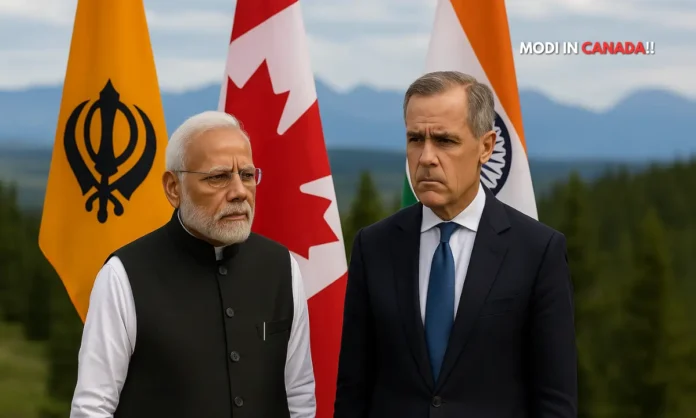Summary
- PM Modi and PM Carney met briefly during the G7 Summit, with both sides emphasizing law enforcement cooperation.
- Carney avoided direct commentary on the Nijjar murder case, citing ongoing judicial processes.
- The two nations agreed to restore full diplomatic presence, signaling cautious rapprochement after months of deep freeze.
G7 Diplomacy Amid a Shadow: Nijjar Case and Bilateral Reset
When Prime Minister Narendra Modi arrived in Canada’s Alberta for the G7 Summit, the headlines weren’t about climate, AI, or global inequality. They were about Hardeep Singh Nijjar—a murdered Canadian Sikh separatist, and the tectonic diplomatic fallout that followed. Canadian Prime Minister Mark Carney, hosting Modi for the first time since assuming office, was expected to either confront or sidestep the politically charged case. He chose the latter, carefully.
Asked whether he had raised Nijjar’s killing during bilateral talks, Carney leaned on restraint: “We discussed the importance of law enforcement dialogue… the importance of addressing transnational repression,” he told reporters. He was quick to follow up with, “There is a judicial process underway, and I need to be careful about further commentary.” In diplomatic terms, that’s a nod to ongoing tension cloaked in procedural language.
For Modi, the visit marked more than symbolic return—it was a stage to reassert India’s global positioning. On X (formerly Twitter), he called it a “productive Canada visit,” highlighting his meetings with leaders from the EU, Japan, South Africa, and Brazil. But the real breakthrough may have come off the main stage: India and Canada agreed to return their ambassadors—an important step toward normalizing relations that had all but collapsed following Nijjar’s killing.
#India & #Canada move to reset ties, agree to appoint new High Commissioners for first time since 2023 Nijjar row. How significant is this? Listen in. @AdityaRajKaul pic.twitter.com/Dslqd5OlWv
— Neha Bhan🇮🇳 (@neha_journo) June 18, 2025
Reading Between the Lines: Carney’s Calculated Caution
- Carney avoided naming Nijjar directly in public remarks during the G7 Summit.
- His emphasis was placed on cooperation in law enforcement and curbing transnational repression.
- The Canadian government is treading carefully to avoid influencing its judiciary or further inflaming Indo-Canadian tensions.
Canada’s new prime minister, Mark Carney, has proven himself to be far more measured than his predecessor. While the Justin Trudeau administration had openly accused “agents of the Indian government” of orchestrating Nijjar’s killing in British Columbia—a claim that led to an unprecedented diplomatic tit-for-tat—Carney opted for a less confrontational tone.
The phrase “transnational repression” was a notable inclusion in Carney’s statement. While it acknowledges a broader issue, it sidesteps specifics about India’s alleged involvement in Nijjar’s murder. It’s a framing that allows Canada to preserve the integrity of its judicial process while not appearing soft on foreign interference.
This rhetorical moderation reflects a broader shift: from public outrage to institutional navigation. There was no reiteration of the explosive charges made in 2023. Instead, Carney focused on “law enforcement cooperation”—suggesting a pivot to closed-door diplomacy and mutual de-escalation. Whether this represents a change in policy or just strategy remains to be seen.
Modi’s Broader Agenda: From PoK to the Global South
- PM Modi reaffirmed India’s stance on Pakistan’s illegal occupation of Kashmir.
- He used the G7 stage to advocate for the Global South and strengthen multipolar alliances.
- Modi’s Canada visit avoided public entanglement in the Nijjar controversy.
Even while Nijjar cast a long shadow, Modi ensured the G7 visit remained multifaceted. He held bilateral meetings with EU leaders, Japan’s Shigeru Ishiba, Brazil’s Luiz Inacio Lula da Silva, and South Africa’s Cyril Ramaphosa. In each interaction, he emphasized India’s commitment to “peace, prosperity, and sustainability,” while spotlighting India’s alignment with the Global South.
Notably, the G7 meeting followed Modi’s call with U.S. President Donald Trump, where the Indian PM clarified that no third-party mediation was requested—or acceptable—on issues like Jammu and Kashmir. Modi’s assertive diplomacy on Pakistan and principled stand on sovereignty were aimed at both domestic and international audiences.
Still, there was little indication that he sought confrontation with Canada on Nijjar. His social media post spoke only of “fruitful discussions on global issues.” There was no mention of Nijjar, no sign of offense taken, and no retaliatory barbs. In diplomatic terms, Modi was signalling a reopening—without explicitly conceding anything.
Conclusion: Cold Case, Warm Reset
What happened in Alberta may not thaw the Indo-Canadian diplomatic chill overnight, but it marks a shift. The agreement to return ambassadors is not symbolic—it’s functional. Mark Carney’s muted remarks on Nijjar and Modi’s decision not to press the matter publicly suggest both countries are trying to reclaim a working relationship, even if grudgingly.
Canada, under Carney, is trying to walk a diplomatic tightrope—reassuring domestic constituencies of justice for Nijjar while re-engaging with a crucial economic and strategic partner. India, for its part, is making it clear that it seeks global leadership and stability, not perpetual conflict with the West.
The road ahead remains uncertain. The judicial process in Canada may still surface revelations that complicate diplomacy. But for now, both capitals are choosing de-escalation. The question is: will justice and geopolitics collide again—or can they, for once, proceed on parallel tracks?


